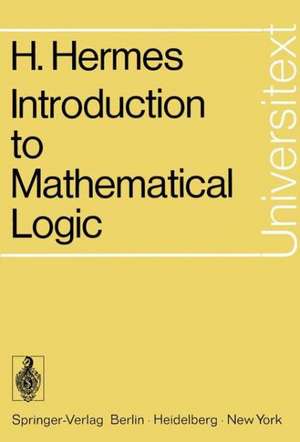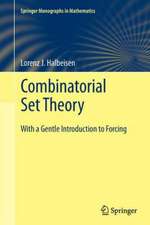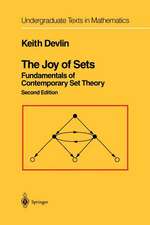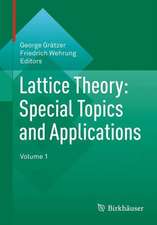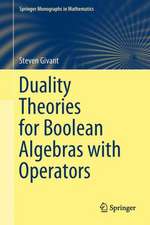Introduction to Mathematical Logic: Universitext
Autor Hans Hermes Traducere de Diana Schmidten Limba Engleză Paperback – 29 ian 1973
Din seria Universitext
- 13%
 Preț: 353.49 lei
Preț: 353.49 lei -
 Preț: 487.96 lei
Preț: 487.96 lei - 15%
 Preț: 543.75 lei
Preț: 543.75 lei -
 Preț: 418.67 lei
Preț: 418.67 lei - 20%
 Preț: 628.22 lei
Preț: 628.22 lei -
 Preț: 322.62 lei
Preț: 322.62 lei - 17%
 Preț: 364.82 lei
Preț: 364.82 lei -
 Preț: 634.38 lei
Preț: 634.38 lei - 17%
 Preț: 427.32 lei
Preț: 427.32 lei - 13%
 Preț: 355.52 lei
Preț: 355.52 lei - 17%
 Preț: 431.50 lei
Preț: 431.50 lei - 19%
 Preț: 429.21 lei
Preț: 429.21 lei - 19%
 Preț: 393.95 lei
Preț: 393.95 lei -
 Preț: 360.08 lei
Preț: 360.08 lei -
 Preț: 358.44 lei
Preț: 358.44 lei - 13%
 Preț: 389.95 lei
Preț: 389.95 lei -
 Preț: 465.61 lei
Preț: 465.61 lei -
 Preț: 371.99 lei
Preț: 371.99 lei - 15%
 Preț: 497.22 lei
Preț: 497.22 lei - 15%
 Preț: 737.46 lei
Preț: 737.46 lei - 17%
 Preț: 394.41 lei
Preț: 394.41 lei - 15%
 Preț: 509.58 lei
Preț: 509.58 lei - 17%
 Preț: 427.68 lei
Preț: 427.68 lei - 8%
 Preț: 495.44 lei
Preț: 495.44 lei - 17%
 Preț: 364.57 lei
Preț: 364.57 lei - 17%
 Preț: 369.08 lei
Preț: 369.08 lei -
 Preț: 396.55 lei
Preț: 396.55 lei - 15%
 Preț: 553.33 lei
Preț: 553.33 lei - 17%
 Preț: 365.35 lei
Preț: 365.35 lei -
 Preț: 356.78 lei
Preț: 356.78 lei -
 Preț: 673.45 lei
Preț: 673.45 lei - 17%
 Preț: 426.76 lei
Preț: 426.76 lei - 20%
 Preț: 569.56 lei
Preț: 569.56 lei -
 Preț: 372.87 lei
Preț: 372.87 lei -
 Preț: 319.07 lei
Preț: 319.07 lei -
 Preț: 379.86 lei
Preț: 379.86 lei -
 Preț: 445.88 lei
Preț: 445.88 lei -
 Preț: 382.36 lei
Preț: 382.36 lei - 15%
 Preț: 533.72 lei
Preț: 533.72 lei - 15%
 Preț: 496.02 lei
Preț: 496.02 lei - 15%
 Preț: 474.82 lei
Preț: 474.82 lei -
 Preț: 389.70 lei
Preț: 389.70 lei -
 Preț: 484.08 lei
Preț: 484.08 lei - 15%
 Preț: 643.48 lei
Preț: 643.48 lei -
 Preț: 415.02 lei
Preț: 415.02 lei - 15%
 Preț: 602.25 lei
Preț: 602.25 lei - 20%
 Preț: 510.24 lei
Preț: 510.24 lei - 15%
 Preț: 588.37 lei
Preț: 588.37 lei -
 Preț: 381.59 lei
Preț: 381.59 lei
Preț: 389.88 lei
Nou
Puncte Express: 585
Preț estimativ în valută:
74.63€ • 81.09$ • 62.73£
74.63€ • 81.09$ • 62.73£
Carte tipărită la comandă
Livrare economică 21 aprilie-05 mai
Preluare comenzi: 021 569.72.76
Specificații
ISBN-13: 9783540058199
ISBN-10: 3540058192
Pagini: 260
Ilustrații: XII, 244 p.
Dimensiuni: 178 x 254 x 14 mm
Greutate: 0.46 kg
Editura: Springer Berlin, Heidelberg
Colecția Springer
Seria Universitext
Locul publicării:Berlin, Heidelberg, Germany
ISBN-10: 3540058192
Pagini: 260
Ilustrații: XII, 244 p.
Dimensiuni: 178 x 254 x 14 mm
Greutate: 0.46 kg
Editura: Springer Berlin, Heidelberg
Colecția Springer
Seria Universitext
Locul publicării:Berlin, Heidelberg, Germany
Public țintă
ResearchCuprins
I. Introduction.- II. The Language of Predicate Logic.- III. The Semantics of Predicate Logic.- IV. A Predicate Calculus.- V. Gödel’s Completeness Theorem.- VI. Peano’s Axiom System.- VII. Extensions of the Language, Normal Forms.- VIII. The Theorems of A. Robinson, Craig and Beth.- IX. Miscellaneous.- Further Reading.- Index of Abbreviations for Defining and Derived Rules.- Notation.- Name and Subject Index.
